Overview
In the demanding world of healthcare, providers often face emotional and administrative challenges that can hinder their ability to deliver optimal patient care. This article presents seven medical speech recognition software solutions designed to alleviate these burdens, ultimately enhancing the experience for both providers and patients alike.
Imagine the relief of having tools like CosmaNeura and Amazon Transcribe Medical at your disposal. These solutions offer features such as real-time transcription and seamless integration with existing workflows. By embracing these technologies, healthcare providers can significantly reduce documentation time, allowing them to focus more on what truly matters—their patients.
Each solution highlights the potential to improve overall healthcare delivery, fostering a supportive environment where providers can thrive. Consider how much more fulfilling your work could be if administrative tasks were streamlined.
We encourage you to explore these innovative solutions further. By understanding how they can transform your workflow, you take an important step toward enhancing your practice and patient care. Together, we can overcome the challenges in healthcare and create a more compassionate experience for all.
Introduction
In the fast-paced realm of healthcare, providers often grapple with overwhelming administrative tasks that can overshadow their true mission: delivering quality patient care. This burden can lead to feelings of frustration and burnout. However, the emergence of advanced medical speech recognition software solutions offers a transformative opportunity for healthcare professionals to streamline documentation and enhance efficiency.
How can these innovative tools alleviate the burden of paperwork while fostering a more compassionate, patient-centered approach to care? By exploring the latest advancements in this technology, we uncover its potential to revolutionize the healthcare landscape. This allows providers to focus on what truly matters—their patients.
Imagine a world where healthcare professionals can dedicate more time to patient interactions rather than being bogged down by administrative duties. With the right tools, this vision can become a reality, paving the way for a more empathetic and effective healthcare system. Let's delve deeper into how these solutions can support your vital work in caring for patients.
CosmaNeura: Streamline Administrative Tasks with AI-Powered Speech Recognition
In the demanding world of healthcare, providers often face overwhelming administrative burdens that can detract from their ability to offer compassionate care. CosmaNeura understands these challenges and harnesses cutting-edge AI technology to alleviate these pressures through the use of medical speech recognition software with advanced capabilities. By automating essential processes like patient intake, documentation, and triage, healthcare professionals can reclaim precious time that was once consumed by routine tasks.
This significant shift allows providers to focus on what truly matters: offering compassionate support to their patients, aligning with the ethical standards of Catholic teachings. The platform's seamless integration with existing workflows enhances usability, making medical speech recognition software a vital tool for primary health providers, particularly those dedicated to faith-based practices.
As Dr. Sara Pastoor observes, AI scribing not only enables primary care physicians to dedicate more time to treating individuals but also ensures thorough and precise documentation. This ultimately , fostering a more nurturing environment for patients. Moreover, through pilot testing with physicians, CosmaNeura demonstrates its commitment to improving personalized treatment while addressing the financial pressures and administrative difficulties that medical providers frequently encounter.
Imagine a world where healthcare providers can truly focus on their patients, free from the shackles of administrative tasks. CosmaNeura is here to make that vision a reality, supporting healthcare professionals in their noble mission to provide care with compassion and dedication.
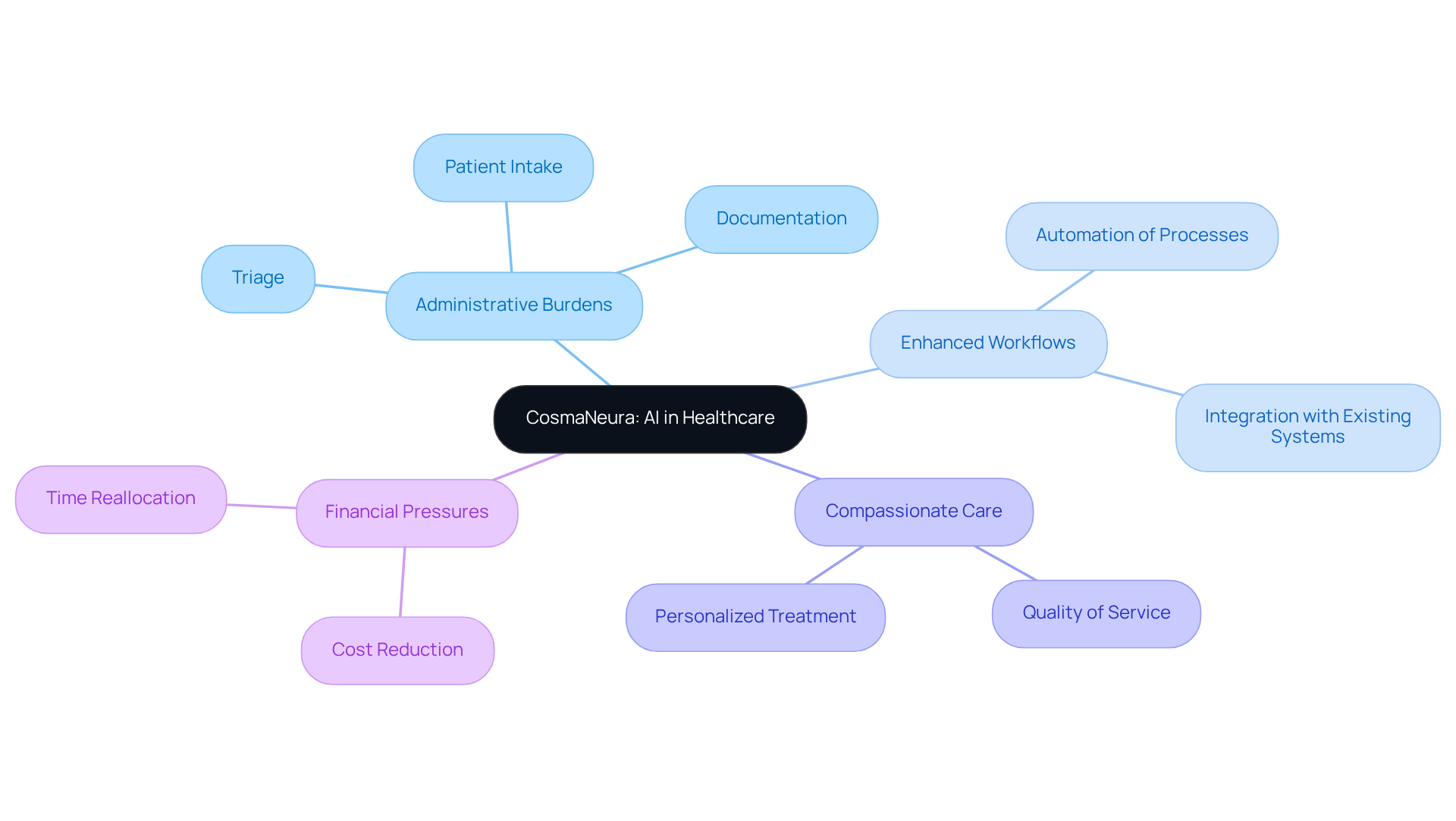
Amazon Transcribe Medical: Achieve Accurate Transcriptions for Enhanced Documentation
Healthcare providers often face overwhelming emotional challenges in their demanding roles. The pressure of extensive record-keeping and administrative tasks can detract from their primary focus: patient care. Have you ever felt that your time could be better spent with clients rather than on paperwork?
Amazon Transcribe Medical is here to help. This specialized cloud-based service, known as medical speech recognition software, is designed for medical professionals and excels in accurately transcribing medical terminology with over 99% accuracy. This precision is vital, especially considering that approximately 90% of adverse events due to medication errors arise from miscommunication of medical terms.
Imagine simplifying your record-keeping processes. With features like real-time transcription and adjustable vocabularies, healthcare professionals can redirect their attention to meaningful client interactions instead of administrative duties. Moreover, its compliance with HIPAA regulations ensures that client data remains secure, enhancing the reliability of medical speech recognition software as a transcription solution.
By integrating seamlessly with electronic health record (EHR) systems, medical speech recognition software such as Amazon Transcribe Medical not only improves the efficiency of clinical records but also fosters better outcomes for individuals.
Key Benefits:
- Real-time transcription allows for immediate documentation.
- Adjustable vocabularies cater to specific medical needs.
- HIPAA compliance guarantees data security.
- Seamless EHR integration enhances workflow efficiency.
Consider how Amazon Transcribe Medical can transform your practice. Embrace the opportunity to reduce administrative burdens and enhance the quality of care you provide. Your clients deserve your full attention, and .
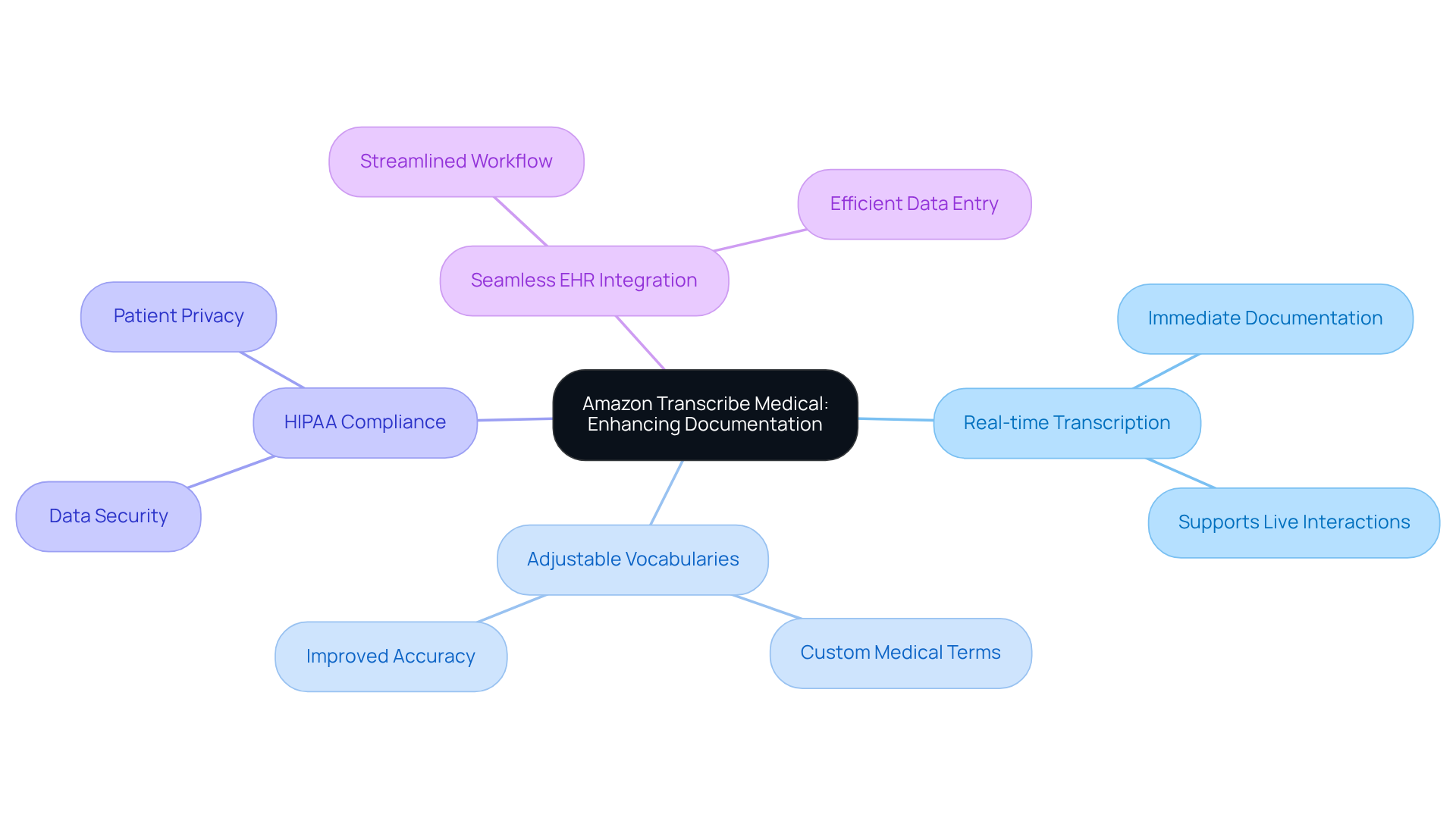
Philips SpeechLive: Accelerate Document Creation with Medical Dictation Solutions
Healthcare professionals often face overwhelming administrative duties that can detract from their primary focus: patient care. Philips SpeechLive offers a cloud-based dictation solution designed specifically to alleviate these burdens. By automating labor-intensive tasks like record-keeping and appointment organization, medical speech recognition software allows doctors to dedicate more time to meaningful interactions with their patients.
Imagine the relief of having the option to choose between real-time speech recognition and secure human transcription, tailored to your workflow preferences. This flexibility not only boosts productivity but also helps maintain the personal connection that is so vital in healthcare. With medical speech recognition software and other , medical providers can significantly reduce burnout and enhance overall system efficiency.
Are you ready to explore how Philips SpeechLive can transform your practice? By embracing medical speech recognition software, you can streamline your documentation needs while focusing on what truly matters—caring for your patients. Let’s take this step together towards a more efficient and compassionate healthcare experience.
Dolbey Fusion Narrate: Boost Productivity with Integrated Speech Recognition
Healthcare providers face numerous emotional challenges, often burdened by administrative tasks that detract from patient care. Dolbey Fusion Narrate is designed to alleviate these pressures. As a cloud-based solution, the medical speech recognition software seamlessly integrates with existing medical software, significantly boosting productivity and reducing repetitive tasks through voice shortcuts.
Imagine a world where advanced AI capabilities automate various workflows, allowing you to focus more on what truly matters—your patients. This innovative platform addresses common concerns about the risks associated with new technologies, offering reassurance and support to providers.
With an impressive in the Speech Recognition: Front-End EHR category, Dolbey's Fusion Narrate highlights its effectiveness in enhancing productivity within healthcare settings. By streamlining documentation processes, medical providers can dedicate more time to meaningful interactions with individuals, ultimately improving the quality of care.
Consider how this integration of speech recognition not only enhances workflow efficiency but also fosters a more patient-centered approach. As John Dolbey, SVP and General Manager, insightfully stated, "The loyalty and satisfaction of our users reflect the worth Dolbey contributes to the medical field."
Furthermore, KLAS provides essential insights and performance data to assist medical organizations in selecting dependable software. This further confirms the transformative impact of Dolbey's solutions in reducing provider burden and improving service delivery.
Are you ready to embrace a solution that prioritizes both your efficiency and your patients' well-being? Explore how Dolbey Fusion Narrate can make a difference in your practice today.
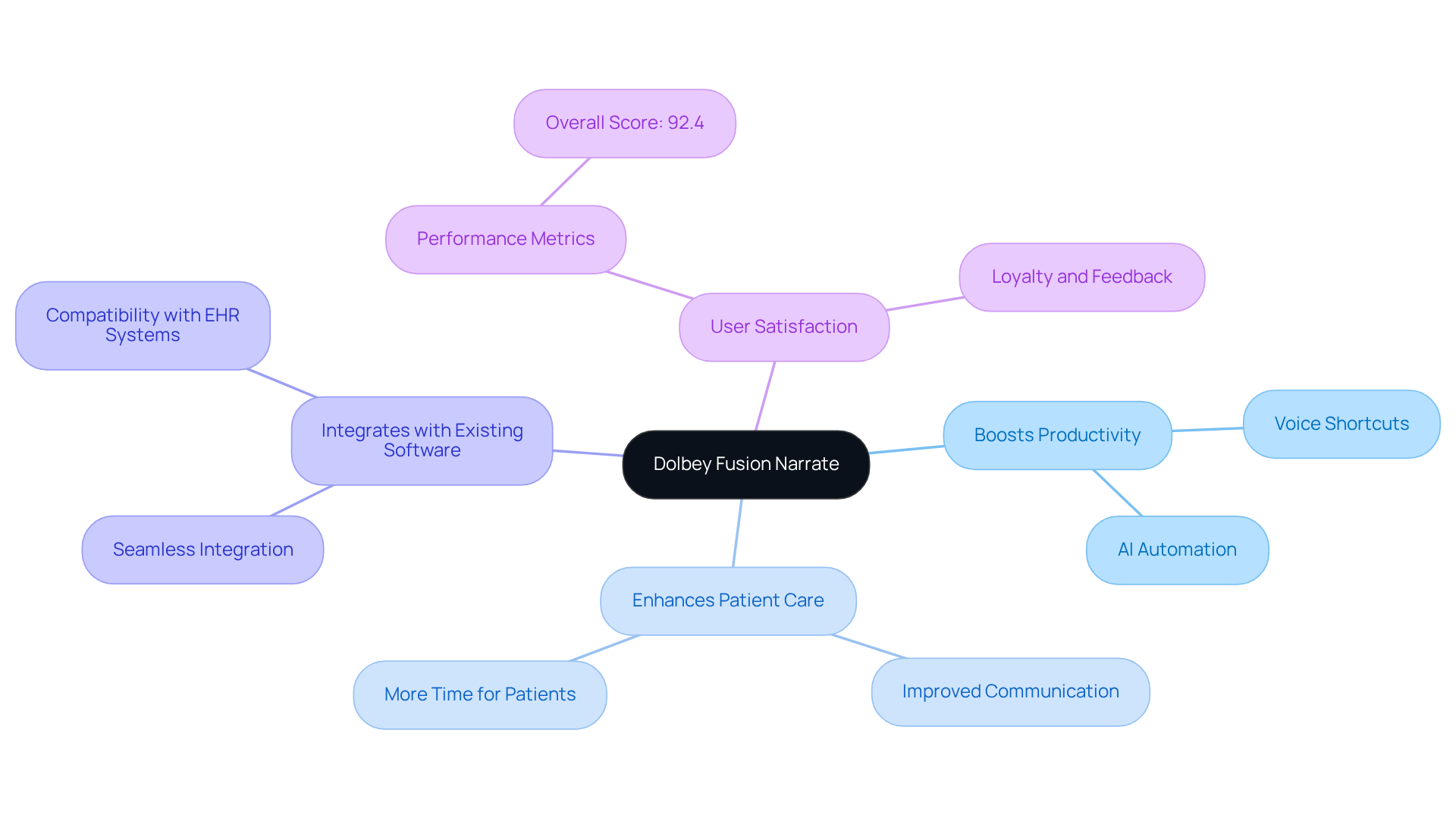
Lindy.ai: Simplify Note-Taking with AI-Driven Medical Speech Recognition
In the demanding world of healthcare, medical professionals often face overwhelming administrative burdens that can detract from their primary focus: patient care. Lindy.ai recognizes these challenges and offers a compassionate solution. By utilizing AI-powered medical speech recognition, Lindy.ai simplifies the note-taking process, allowing clinicians to devote more time to meaningful interactions with individuals.
Imagine a system powered by medical speech recognition software that employs advanced algorithms to accurately identify specialized medical terminology, ensuring that records are not only precise but also contextually appropriate. This streamlining of the record-keeping process enhances clinician engagement and fosters a more compassionate experience in medical settings. As a result, the quality of service improves, ultimately leading to better patient outcomes.
However, as we embrace these technological advancements, it’s crucial to acknowledge potential challenges, such as:
- Data privacy concerns
- The need for physician trust
By addressing these issues thoughtfully, we can pave the way for a future where AI technologies enhance the healthcare experience for both providers and patients. Together, let’s explore how Lindy.ai can and promote a more empathetic approach to care.
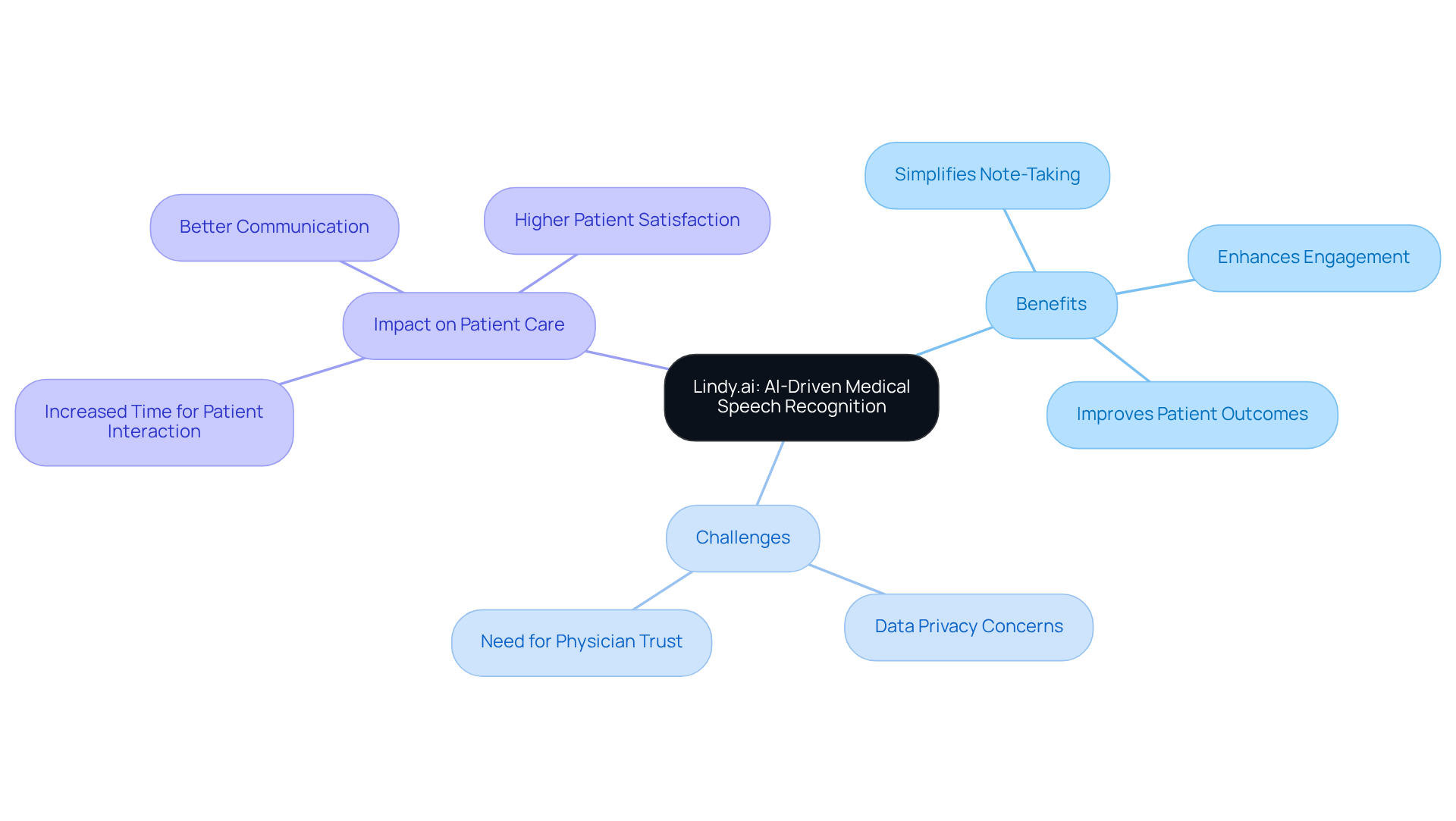
ECRI: Enhance Medication Safety with Speech Recognition Software
ECRI understands the emotional challenges that healthcare providers face when it comes to medication safety. The pressure to deliver accurate care can be overwhelming, especially when administrative burdens distract from patient interactions. By advocating for the integration of speech recognition software, ECRI offers a compassionate solution that aims to significantly reduce errors in medication orders and client instructions.
Imagine a workplace where healthcare providers can dictate orders with confidence, knowing that essential information is accurately captured and communicated. This proactive strategy not only safeguards individuals but also elevates the standard of care provided. Real-world applications show that implementing such technology can lead to a marked decrease in medication errors, fostering a safer clinical environment for everyone involved.
Experts agree that reducing documentation mistakes is crucial, as inaccuracies can lead to negative outcomes for patients. The effect of speech recognition on medication safety is profound, streamlining workflows and enhancing communication among medical teams. This ultimately contributes to improved patient safety and care quality, nurturing an environment where both providers and patients can thrive together.
Let us embrace these innovative solutions that not only protect individuals but also empower healthcare providers to focus on what truly matters—their patients. Together, we can create a .
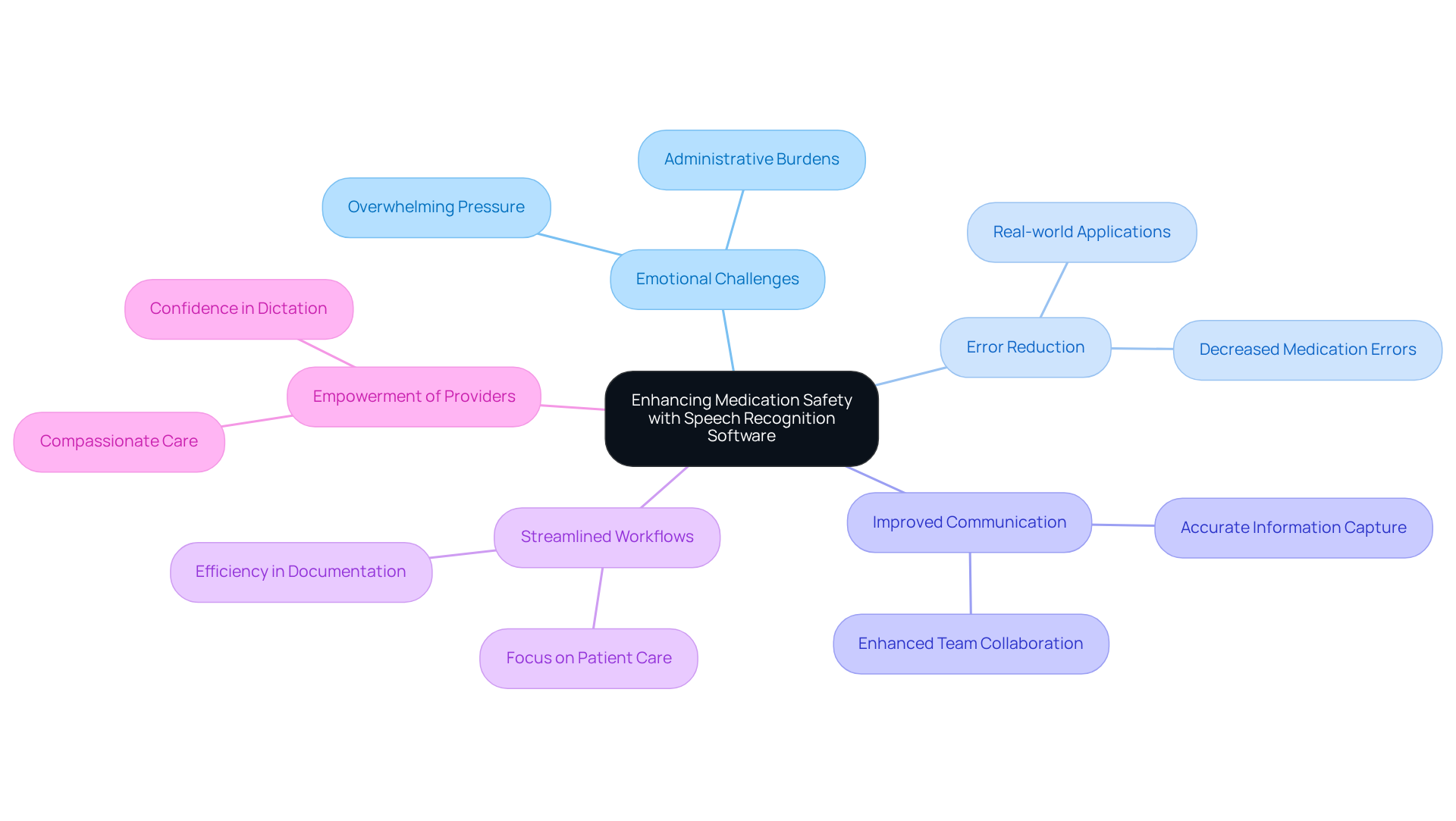
ResearchGate: Analyze Time and Cost Efficiency of Speech Recognition in Healthcare
In the fast-paced world of healthcare, providers often face overwhelming documentation burdens. How can we alleviate these pressures to enhance patient care? ResearchGate offers a comprehensive examination of the in medical environments. Evidence shows that these tools can drastically reduce documentation time, resulting in significant operational cost savings and enhanced workflow efficiency.
For instance, medical providers have reported an impressive 81% reduction in monthly transcription costs following the adoption of speech recognition. This translates to a total savings of approximately $1.37 million during a study period. Moreover, clinicians experienced a 57% reduction in time spent recording interactions, enabling them to focus more on providing services. This aligns seamlessly with the mission of delivering compassionate medical care, allowing providers to dedicate their expertise to patient interactions rather than administrative tasks.
Integrating medical speech recognition software not only boosts productivity but also fosters a more patient-centered approach to care. Imagine a healthcare environment where providers can truly focus on what matters most—their patients. By embracing these innovative solutions, we can create a more compassionate healthcare experience for everyone involved.
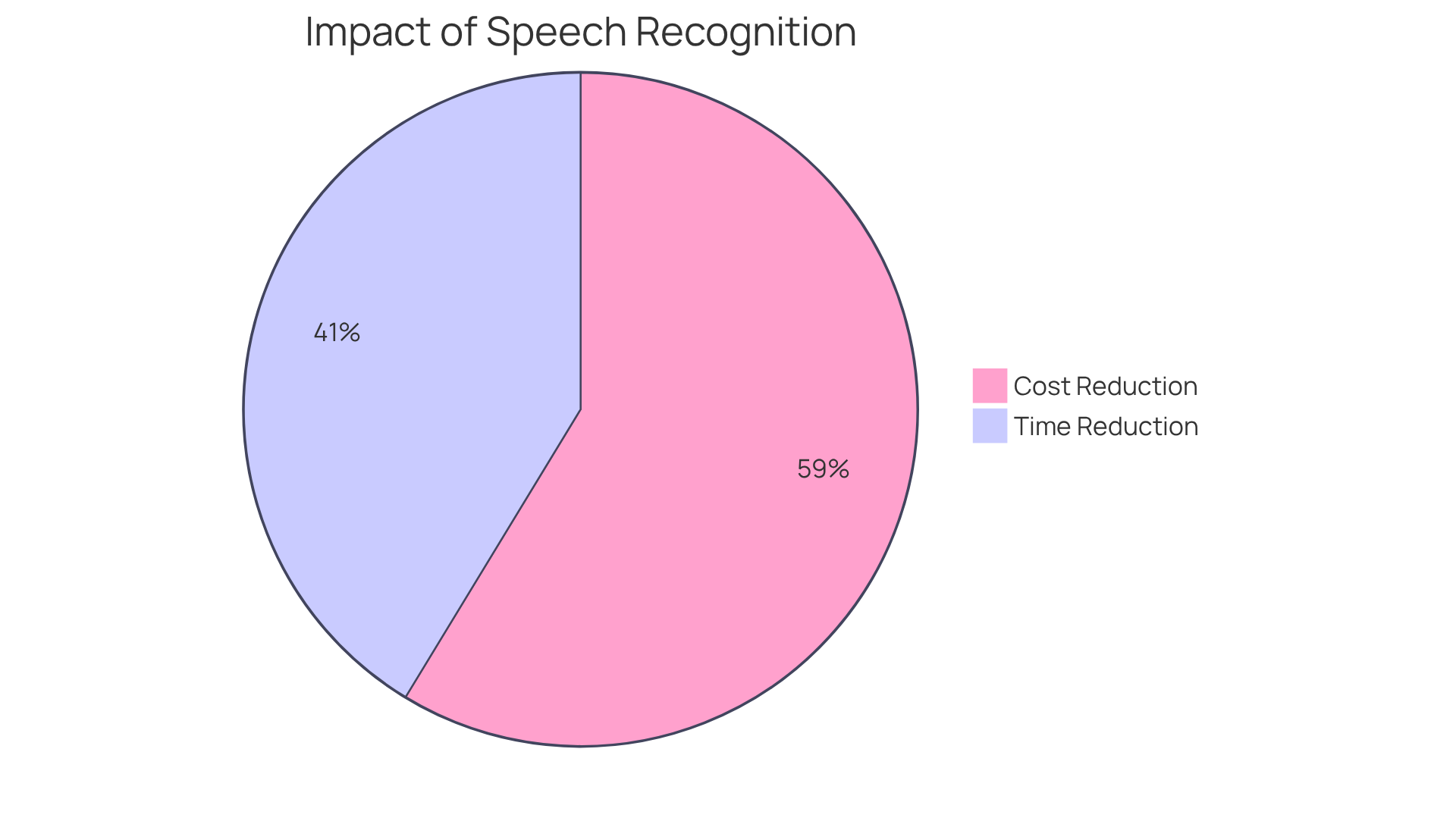
PMC: Improve Clinical Documentation with Speech Recognition Technology
The incorporation of speech recognition technology in clinical records is truly transforming medical practices, addressing the emotional challenges that healthcare professionals face daily. By allowing them to dictate notes in real-time, this technology significantly enhances the accuracy and completeness of medical records, alleviating some of the burdens that can detract from patient care. Research indicates that the typical recording time per note fell by 28.8% after the introduction of automatic speech recognition (ASR) systems. This shift enables clinicians to rather than being bogged down by administrative duties.
Real-world examples illustrate the profound effectiveness of this technology. For instance, a large hospital chain in Asia reported a remarkable 46% increase in efficiency following the adoption of a voice AI system. This advancement not only improved workflow but also contributed to a reduction in clinician burnout. Furthermore, individuals have expressed gratitude for the precision and comprehensiveness of their medical records when utilizing speech recognition in their presence, enhancing their overall experience.
Views among medical professionals suggest that real-time dictation technology is an essential tool for enhancing the management of individuals receiving care. Many clinicians have observed that it allows for richer content in notes, reducing the need for repetitive data entry and ultimately enhancing the quality of care provided. As the medical landscape continues to evolve, it is clear that the role of speech recognition technology in improving record accuracy and management outcomes will become increasingly prominent.
In embracing these advancements, we invite healthcare providers to explore how such tools can not only streamline their workflows but also enrich the care they provide. By recognizing the potential of speech recognition technology, we can work together to foster a more compassionate and efficient healthcare environment.
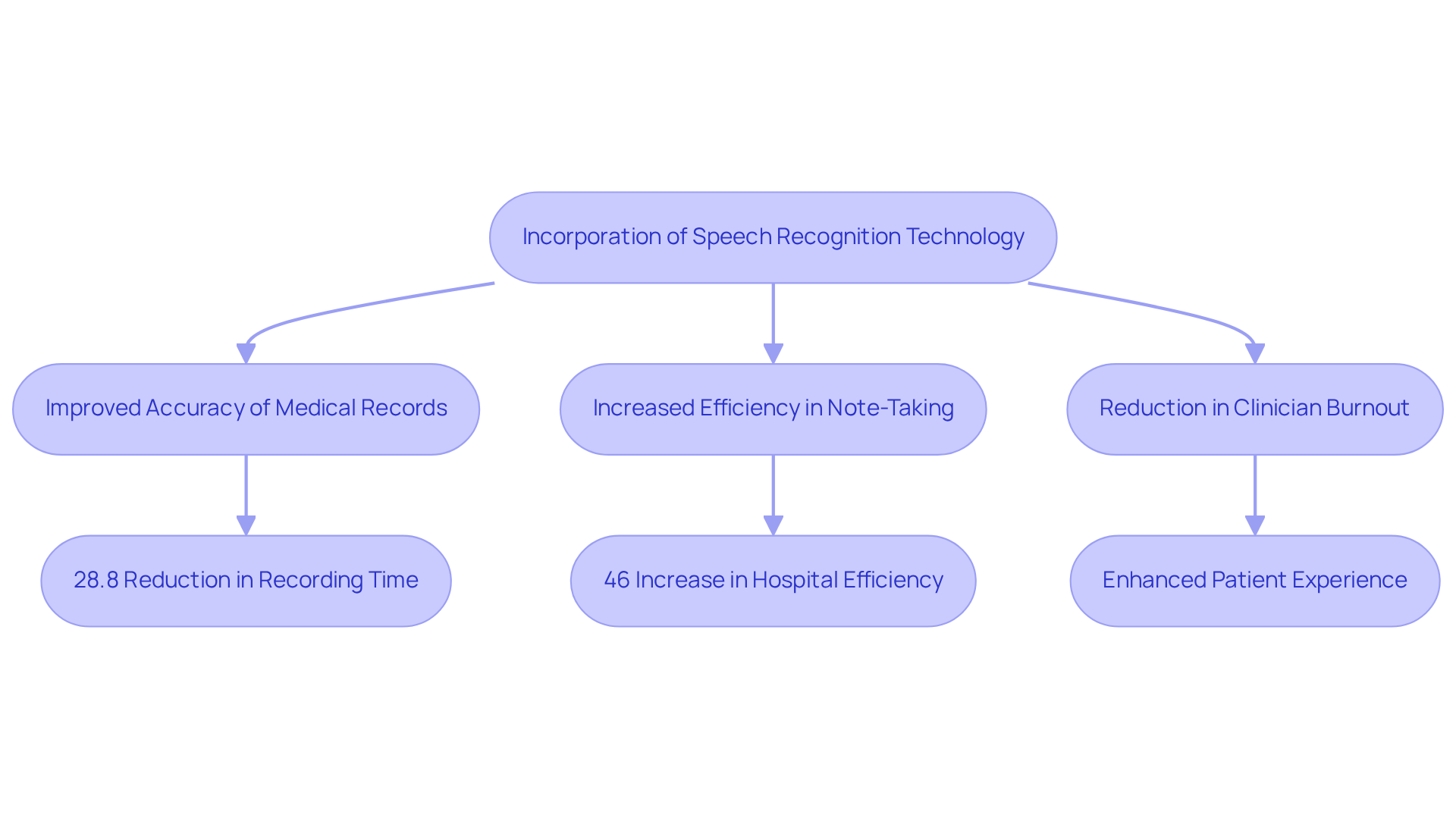
Zapier: Discover Time-Saving Dictation Software for Healthcare Professionals
Healthcare providers often face overwhelming challenges, particularly the pressing issue of burnout. In this demanding environment, Zapier emerges as a compassionate ally, effortlessly linking various dictation software tools. This integration optimizes workflows, allowing clinicians to reclaim precious time that can be devoted to patient support.
Imagine the relief of automating repetitive tasks and integrating applications seamlessly. Practices using AI dictation tools have reported an impressive 60% increase in patient-facing time. This shift enables providers to concentrate more on delivering quality care, fostering stronger connections with their patients.
Moreover, organizations embracing workflow automation have experienced a 30% reduction in administrative workload. Such advancements highlight the significant impact of these technologies on provider efficiency and well-being. As the medical field evolves, leveraging medical speech recognition software like Zapier to enhance dictation processes will be vital in optimizing operations and improving patient outcomes.
What if you could and less time on paperwork? By embracing these innovative solutions, healthcare providers can create a more cohesive workflow, ultimately benefiting both themselves and the patients they serve. Now is the time to explore how Zapier can transform your practice and support your commitment to quality care.
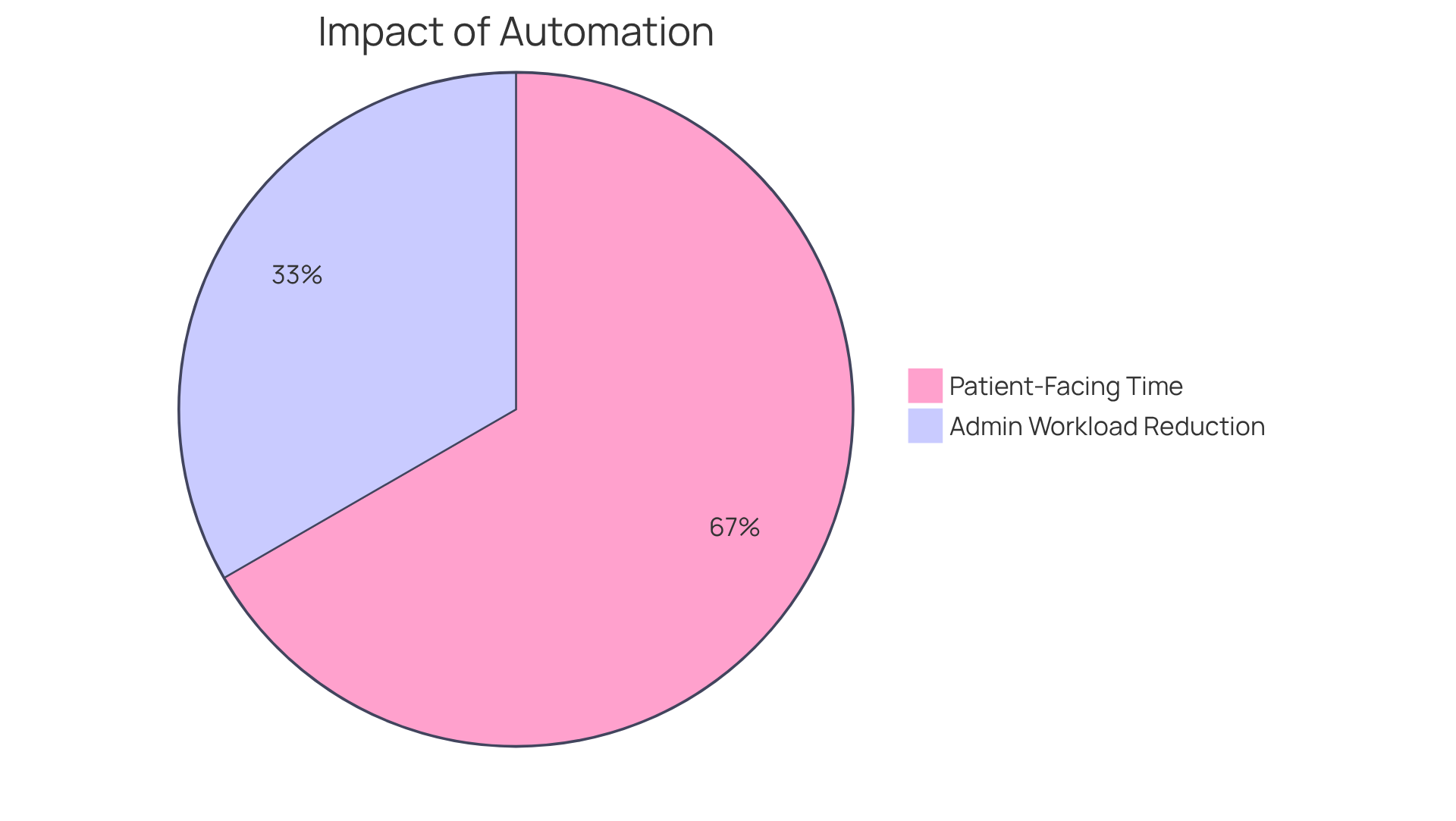
Tali.ai: Compare Medical Dictation and Transcription for Optimal Workflow
Healthcare providers often face overwhelming administrative burdens that can detract from their primary focus: patient care. Tali.ai understands these emotional challenges and offers a detailed comparison of medical dictation and transcription methods, including medical speech recognition software, empowering clinicians to select workflows that truly meet their needs. By assessing the strengths and weaknesses of various methods, Tali.ai equips healthcare providers with the insights necessary to enhance their record-keeping procedures.
Imagine dedicating more than 75% of your visit time to engaging with patients, as noted by clinicians like Whitney Johnson, PA-C. This reality underscores the urgent need for . Tali.ai's commitment to improving workflows is essential in this context. The integration of medical speech recognition software and other AI-powered tools has shown a significant reduction in record-keeping time, allowing for deeper interactions with those receiving care and ultimately elevating the quality of service.
As the healthcare landscape continues to evolve, Tali.ai's focus on streamlining documentation workflows not only boosts operational efficiency but also fosters better patient outcomes through accurate and timely record-keeping. Take the first step towards transforming your practice by exploring how Tali.ai can support your journey to improved patient care.
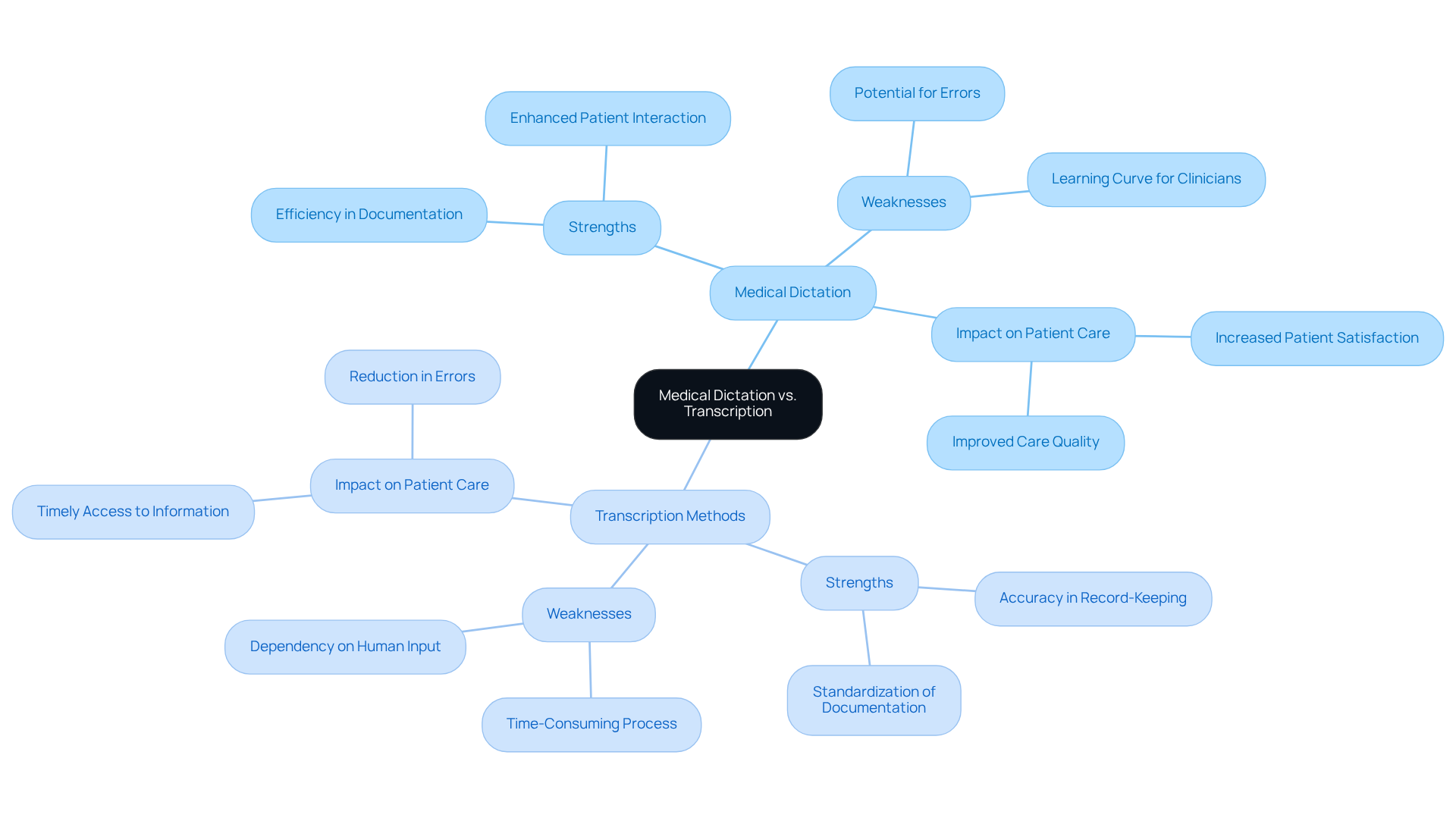
Conclusion
In the realm of healthcare, the integration of medical speech recognition software is a transformative approach that alleviates the administrative burdens faced by providers. This technology empowers healthcare professionals to focus on their primary mission: delivering compassionate and effective patient care. By automating documentation and streamlining workflows, solutions like CosmaNeura and Amazon Transcribe Medical pave the way for a more efficient healthcare environment.
Consider the emotional challenges faced by healthcare providers. The weight of administrative tasks can often overshadow the joy of patient interactions. Various software solutions offer unique features that enhance documentation accuracy and reduce the time spent on these burdensome tasks. From the AI-driven capabilities of Lindy.ai to the impressive transcription accuracy of Amazon Transcribe Medical, these tools not only improve efficiency but also foster a deeper connection between providers and their patients.
As we reflect on user experiences and research, it becomes clear that significant cost savings and time reductions are achievable through the adoption of these technologies. As the healthcare landscape continues to evolve, embracing medical speech recognition software is not merely an option but a necessity for enhancing patient care and safety. By leveraging these innovative solutions, healthcare providers can reclaim valuable time, reduce burnout, and ultimately provide a higher standard of care.
The call to action is clear: explore the potential of these technologies to transform your practice. Imagine a future where compassionate care takes precedence over administrative tasks. Together, let's commit to this vision and prioritize the well-being of both providers and patients.




